Gnaeus Pompeius Magnus, or Pompey for short, was a high-profile politician and military leader during the Roman Empire’s fall from grace. Pompey had an incredibly successful career until his ambitions got ahead of him. Once an ardent supporter of Caesar, he would eventually turn his back on his former friend, becoming a key player during Caesar’s civil war. This is the story of how Pompey went from being a Roman hero to a lowly exile who was assassinated in Egypt.

Pompey’s rise to rule was swift, but so was his fall (Carole Raddato / CC BY SA 2.0 )
Pompey’s Early Career
Pompey grew up in a military family. He was born in 106 BC in Picenum, a region of ancient Italy. He came from noble stock; his father, Gnaeus Pompeius Strabo, was a former plebeian who had worked his way up to senatorial status. Pompey’s father was a military man known for his greed, political double-dealing, and ruthlessness in battle. Traits, it turns out, Pompey inherited.
Pompey followed in his father’s footsteps and joined the military at a young age. He fought in the Social Wars, a series of conflicts between Rome and its autonomous allies over whether they should be granted Roman citizenship or not, from 91 BC to 89 BC, where he proved himself a capable soldier. His father died in 87 BC, and Pompey got his first taste of scandal. When Strabo died, Pompey was put on trial. It was claimed that his father had stolen public property; as his heir, it was now Pompey’s responsibility.
Pompey carried out an investigation and discovered it had been one of his father’s men who had carried out the crime. The matter went to court, and Pompey came out on top. During the trial, the judge had taken a liking to Pompey, going so far as to offer him his daughter’s hand in marriage. Needless to say, Pompey was acquitted by his new father-in-law.
Four years later, in 83 BC, Pompey took control of a private army of three legions. These legions consisted of veterans from his father’s army. He used this army to fight for Sulla, a Roman general and statesman who was fighting a civil war against the Marians, a rival faction that had seized Rome while Sulla had been busy fighting the First Mithridatic War .
Sulla was evidently pleased with Pompey’s work, since he sent Pompey to Sicily and then Africa as a pro praetor magistrate to put down rebels. Pompey once again did a good job, and Sulla rewarded him with his first triumph. A triumph was a special civil and religious ceremony carried out to celebrate a commander who had achieved a great victory.

Pompey and Sulla, drawing from 1500 ( Public Domain )
Being rewarded with a triumph was a big deal, but especially so for Pompey. At the time, Pompey was only an equites, a kind of lesser noble, and so wasn’t technically eligible for a triumph. Sulla rewarded him with one anyway.
It seems this triumph went to Pompey’s head a little. Not long after he gave himself the name Magnus, or ‘the great’, likely in an attempt to echo the ultimate Macedonian general, Alexander the Great. Pompey had ingratiated himself with Sulla to such a degree that after Pompey’s wife died, he was allowed to marry Sulla’s stepdaughter, Mucia Tertia.
Pompey’s winning streak hit a bump in 78 BC, when he chose to support Lepidus, a political rival of Sulla, for the consulship. This resulted in Pompey being removed from Sulla’s will.
He righted this the next year by supporting Quintus Lutatius Catulus, Sulla’s ally, for the consulship. Then back in Sulla’s good graces, Pompey was sent to Spain in 77 BC as proconsul. He had been sent to help fight Sertorius, a leading opponent, and a long-term thorn in Sulla’s side.
Sertorius was eventually defeated and murdered. With the fighting done, Pompey chose to spend some time in the region to make sure no one else would be tempted to rise up. During that time, he proved himself to be a talented administrator.
While Pompey had been in Spain, the Third Servile War had broken out. This was a slave rebellion led by the gladiator Spartacus. After finishing up in Spain, Pompey was sent by the Senate to help Crassus, another high-profile general, put down the slave rebellion.
Pompey arrived late to the party, but that didn’t stop him from trying to take all the credit. By the time he and his men arrived, Crassus had defeated most of the enemy. Pompey slaughtered 6,000 slaves who had fled from the battle. He then wrote to the senate stating that Crassus had done a good job, but it was he, Pompey, who had finally put an end to the fighting.
Rather amusingly, it appears Crassus knew Pompey would do this. In a letter, he admitted that he had held back on asking for reinforcements for just this reason. He suspected the Senate would send Pompey, and he knew the man well enough to know he’d get all the credit.
When Pompey finally arrived home in 71 BC, he was rewarded with his second triumph. His victories soon paved the way for him to become consul, the highest elected political office in the Roman Republic.
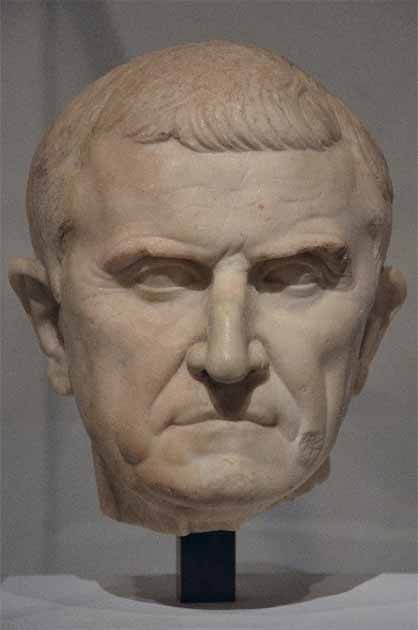
Crassus, Pompey’s political rival turned begrudging ally, 1st century BC fragment (Following Hadrian / CC BY SA 2.0 )
Pompey’s Rapid Ascent
By the time 70 BC rolled around, Pompey was a skilled politician and military leader. He felt he was ready for the consulship. The only problem was that he wasn’t eligible. He was considered too young and hadn’t even served as a quaestor or praetor yet. Luckily for him, he was now related to Sulla by marriage, which meant a blind eye was turned and the rules were waived.
In 70 BC, Pompey became co-consul with Crassus, whose hard work he had only just finished claiming as his own. At the end of the year, it was standard procedure for a consul to take a province under their control.
Pompey had other plans, however. The empire was currently dealing with a piracy pandemic in the Mediterranean, a perfect opportunity for Pompey to prove himself. The Gabinian Law of 67 BC gave Pompey ultimate control over the Mediterranean, and thus the power and authority he needed to take the fight to the pirates.
Pompey knocked it out of the park. The Gabinian Law gave him control of the Mediterranean for three years, but he was finished in just three months. The senate was so impressed that they passed another law, handing him command of the Roman army so that he could take on Mithridates VI Eupator .
Mithridates was the ruler of Pontus in Northern Anatolia. He had made it his life’s mission to dominate Asia Minor and break the Roman stranglehold over Asia and the Hellenic world. He was one of the Roman Republic’s most dangerous enemies and only a general of Pompey’s caliber stood a chance against him. Despite this, there was strong opposition to this law at the time, as some politicians had begun to fear Pompey’s growing influence.
This turned out to be a wise move. Pompey wasted no time in defeating Mithridates and bringing an end to the Third Mithridatic War. With the war at an end, Pompey turned Bithynia, Pontus, and Syria into Roman provinces. This victory set the stage for Rome’s future advances to the east.
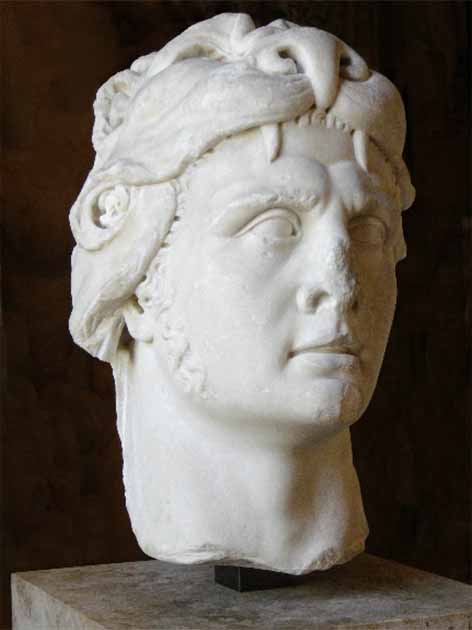
Bust of Mithridates IV, who engaged Rome in three wars, 1st century (Sting / CC BY SA 2.5 )
Pompey returned to Italy in 62 BC and disbanded his army. He arrived in Rome on his birthday, September 20, 61 BC, and received a hero’s welcome. A celebration the likes of which Rome had never seen before was held for over two days. Pompey had years of victories to flaunt and he did so, all at once.
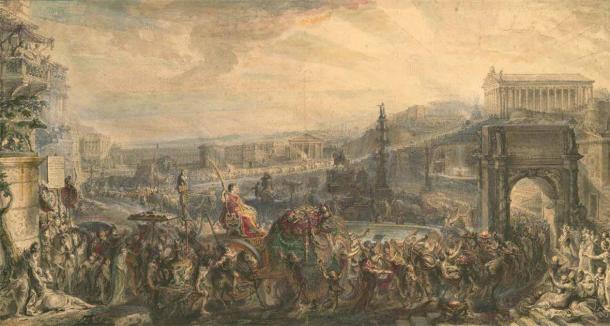
The Triumph of Pompey, watercolor by Gabriel de Saint-Aubin, 1765 ( Public Domain )
This doesn’t mean Pompey got everything he wanted, however. Pompey’s proposal for land grants for his recently disbanded army was denied, as well as the ratification of his eastern settlements.
Pompey was understandably annoyed, after all he had done for the Roman Empire. When Caesar returned from Spain in 60 BC, Pompey formed the first triumvirate. This was an uneasy alliance between himself, Caesar, and Crassus. The three most politically influential and powerful men in Rome had chosen to team up.
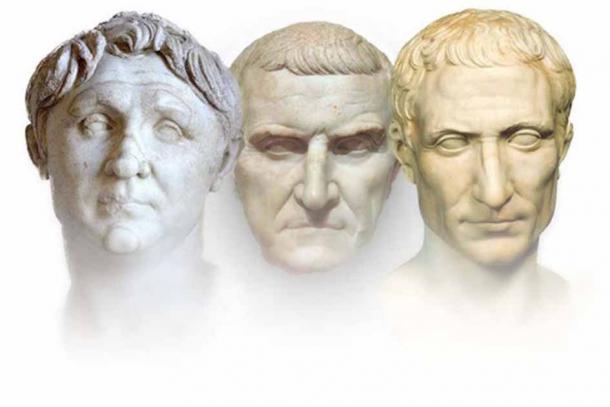
The First Triumvirate of the Roman Republic (left to right) Gnaeus Pompeius Magnus, Marcus Licinius Crassus, and Gaius Julius Caesar. (Mary Harrsch / CC BY SA 4.0 )
Pompey’s Peak
Caesar became consul in 59 BC, largely thanks to the support of Pompey and Crassus. Pompey soon had the land grants for his veteran soldiers fulfilled and his settlements in the east ratified. His triumvirate was clearly working.
Pompey’s next move was to divorce his wife Marcia, now that there was nothing to be gained politically from their marriage, and marry Caesar’s daughter, Julia. This was a political marriage designed to tie the two men together, but it would appear that Pompey did grow to genuinely love his third wife.
From this point, Pompey began to leave his military role behind and shifted his attention to public and civilian matters. In 57 BC, he was given control of Rome’s grain supply. This was a very important role that lasted for years and came with fifteen legates but no army. He once again excelled in the role, taking logistical skills as a general and applying them to the organization of grain supplies.
The triumvirate had the occasional hiccup, such as populist politician Publicus Clodius Pulcher openly opposing the triumvirate. Pompey also failed to reinstate Ptolemy XII Auletes, Cleopatra’s father, to power in Egypt. Despite these minor issues, things were looking up for the triumvirate.
In 55 BC, the three men met in Luca to reaffirm their agreement. Not long after, Pompey and Crassus were once again made consuls. Pompey had also been given two Spanish provinces to govern.
He chose to have these run by legates, as he preferred life in Rome. His various victories had brought him an insane level of wealth. Much of this wealth poured into the state treasury, making Pompey incredibly popular. His contributions to the state coffers are best exemplified by the building of the Theater of Pompey just outside of Rome. It was opened with extravagant games and consisted of both a temple to Venus and a grand statue of Pompey himself.
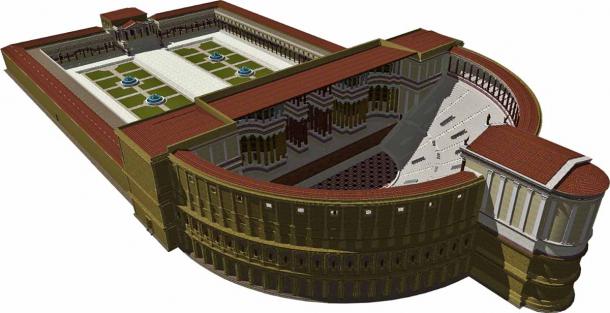
A computer generated model of the Theater of Pompey (Lasha Tskhondia / CC BY SA 3.0 )
It wasn’t all sunshine and roses for Pompey, though. In 54 BC, his wife, Julia, died in childbirth. Pompey refused to re-enter another political marriage to retie himself to Caesar. Then in 53 BC, Crassus was killed in Parthia. Both these events caused a build-up in tension between Pompey and Caesar.
Pompey was once again elected consul in 52 BC. Pompey made a slew of decisions that upset Caesar. These included backing Caesar’s political enemies, drafting new legislation which displeased Caesar, and even increasing his imperium for five years.
The two men were rapidly approaching loggerheads. Rome effectively had two kings vying for control. Bloodshed was to come.
The Civil War
The two men began preparing for war. Pompey took control of the Republic’s armies in 49 BC. He then moved his army to Macedonia and mobilized his forces, ready for a fight.
Caesar arrived in 48 BC, also prepared for battle. Caesar attempted to blockade Pompey in Dyrrachium (modern-day Albania), but Pompey knew he was outnumbered and retreated. The problem was Caesar’s army was battle-hardened and highly experienced, while Pompey had essentially had to gather one from scratch. Pompey’s army lacked experience.
The two sides clashed on August 9, 48 BC at Pharsalus in Thessaly. It was a bloodbath, and Pompey suffered massive losses. To this day, it is unclear what ever possessed Pompey to even attempt fighting this particular battle. A leader has experienced as he should have known he didn’t stand a chance.
Caesar and his army were simply too much for Pompey, and he was forced to flee to Egypt. This spelled his end. As he was getting off his ship at Alexandria on September 28, 48 BC, he was stabbed to death. Pompey was dead, and so was democratic Rome. In Pompey’s absence, Caesar rose to power, and Imperial Rome was born.
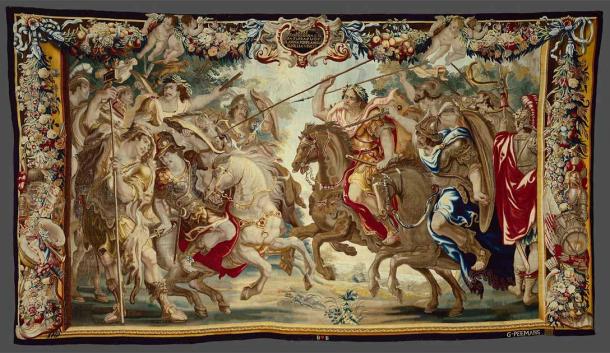
Caesar Defeats the Troops of Pompey, Justus van Egmont, 1680 ( Public Domain )
Conclusion
Did Pompey deserve what he got? It’s hard to say. His is a cautionary tale of what too much ambition can do to a man. Had he been happy to simply enjoy his massive wealth and go into retirement it is likely he would have lived out his days peacefully.
Instead, Pompey chose to continue his rise to power, and in doing so, made an enemy out of a powerful ally, Caesar. Pompey may have been a great military leader, but history shows that Caesar was simply better.
Today, Pompey is often remembered as one of history’s great losers. But is this fair? His ambition indeed brought about his end. But on the other hand, if he had been content to rest on his laurels, would we still be writing about him today? To a man like Pompey, it is probably better to be remembered as a loser than to be forgotten completely.
Top Image: The death of Pompey, a tragic end to an impressive life, 18th century painting by unknown artist Source: Public Domain
By Robbie Mitchell
Related posts:
Views: 0
 RSS Feed
RSS Feed

















 December 8th, 2022
December 8th, 2022  Awake Goy
Awake Goy  Posted in
Posted in  Tags:
Tags: 
















